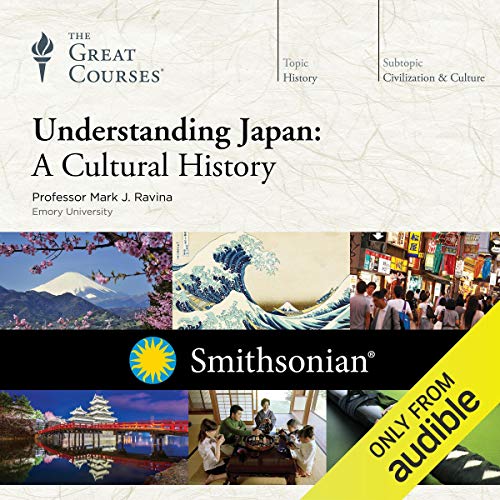Mark J. Ravina – Understanding Japan Audiobook
Mark J. Ravina – Understanding Japan Audiobook

Wonderful. It is 4 DVDs, each DVD has concerning 5 talks on it. The majority of it is Dr. Ravina lecturing on a stage, however this is enhanced by maps, colour pictures, and timelines. He additionally has a common sense of humour.
It is a lot more helpful than a normal documentary on TV, but not as academic as an university program. I know a lot more regarding Japanese history thanks to this DVD set. I find typical TELEVISION programs on history to be much also cosy, done extra for entertainment than mentor. Dr. Ravina’s talks are both. He presumes you know nothing concerning Japanese background. I’ll read his publications. Understanding Japan Audiobook Free. These are twenty-four lectures on the history of Japan that offers considerable coverage of social parts in additional to the common political elements of history. This manufacturing by The Great Courses is released in partnership with the Smithsonian which I intend offered their collections of Japanese artwork and archival material. I listened to the audio version, so any kind of visuals were not offered to me. The speaker, Mark J. Ravina, has extensive history in research studies of East Asia and Japan specifically. In Lecture 4 that talks about interesting facets of the Japanese Language it ends up being noticeable that he’s well-versed in the Japanese language.
A significant factor made by the talks is that the impression we obtained in our world background classes that Japan had actually constantly been isolated from the globe neighborhood of nations till Admiral Perry sailed right into Tokyo nurture in 1853 is an over simplification of background. Japan has traditionally experienced cycles of isolation adhered to by involvement in world affairs. In the late 500s a strong central emperor-led Ritsuryō state arised partially influenced by effective states in China and also Korea throughout that period. After that Japan went through its initial duration of seclusion from the 800s to the 1300s throughout the Heian era. Japan’s second wave of globalization extended from the 1300s to the 1600s. This era finished with the unsuccessful effort of the powerful warlord Toyotomi Hideyoshi to attack China using Korea. Japan after that got on a 250 year Tokugawa shogunate duration throughout which globalization and Christianity were stopped. After that the 3rd significant duration of Japanese globalization accompanied the Meiji Restoration in the late 1800s.
Lectures 18 as well as 19 supply an interesting description Japan before The second world war as it stumbled into battles in China without a plan of attack. It shows up that rouge military officers established a puppet government in Manchuria (Manchukuo) without orders from the main Japanese federal government. Similar independent efforts in the field caused the invasion of China. An evaluation of background from our blog post battle viewpoint suggests that Japan’s initiating the battle was a traditional instance of “groupthink” that was nation broad in scope.
The lack of preparatory planning for the invasion of China caused a Japanese military with insufficient logistical support that triggered them to depend upon looting the land they were attacking. Mark J. Ravina – Understanding Japan Audio Book Download. Their shortage of materials meant they had no capability to take prisoners of battle. Thus killing detainees was their choice. Robbery and killing brought about a mindset that led to the “Nanking massacre.”
I had an interest in the summary of Japan’s financial development and the subsequent bursting of the Japanese realty bubble and the significant stock exchange accident due to the fact that they occurred within my own life time. In the final lecture there is a suggestion the Japan’s lack of financial development since the 1980s has actually not resulted in deterioration of the lifestyle in Japan. As an example they still have the world’s lengthiest average lifetime. Possibly fixed financial growth is OKAY. This training course was awesome! I’m not exactly sure it’s a great suitable for professionals of Japanese background … But also for me it was best. After dipping my toes into Japanese history over the past couple of decades I desired a summary of its different eras. Regrettably, it’s been surprisingly hard for me to locate something like that. I seem like my libraries always seem to have that stupid Costs O’Reilly publication about WWII, or a lot of outdated books from years ago that take an orientalism POV on Japan’s background. Not actually what I was trying to find.
This, however, assisted me understand the broader patterns of Japanese background in the context of seclusion versus globalism. It also has talks on numerous cultural aspects (mythology, grammars, food, household, gardening, literary works, bushido, etc) as well as traces these things throughout centuries.